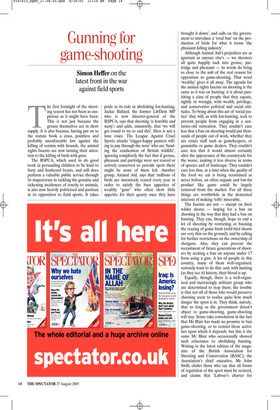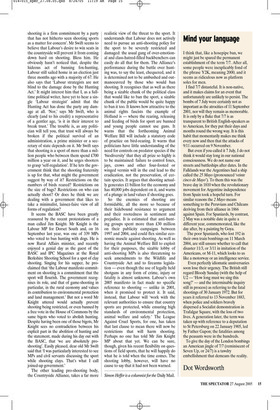Gunning for game-shooting
Simon Heffer on the latest front in the war against field sports The first fortnight of the shooting season has not been as auspicious as it might have been. This is not just because the grouse themselves are in short supply. It is also because, having put on to the statute book a crass, pointless and probably unenforcable law against the killing of vermin with hounds, the animal rights fascists are now turning their attention to the killing of birds with guns.
The RSPCA, which used to do good work in persuading children to be kind to furry and feathered beasts, and still does perform a valuable public service through its inspectorate in tackling the genuine and sickening incidences of cruelty to animals, is also now heavily politicised and partisan in its opposition to field sports. It takes pride in its role in abolishing fox-hunting. Jackie Ballard, the former LibDem MP who is now director-general of the RSPCA, says that shooting ‘is horrible and nasty’; and adds, minatorily, that ‘we will get round to try to end this’. Hers is not a lone voice. The League Against Cruel Sports attacks ‘trigger-happy punters willing to pay through the nose’ who are ‘funding the eradication of British wildlife’, ignoring completely the fact that if grouse, pheasant and partridge were not reared or actively conserved to provide sport there might be none of them left. Another group, Animal Aid, says that ‘millions of birds are intensively reared every year in order to satisfy the base appetites of wealthy “guns” who often show little appetite for their quarry once they have brought it down’, and calls on the government to introduce a ‘total ban’ on the production of birds for what it terms ‘the pheasant killing industry’.
Although Animal Aid’s prejudices are as ignorant as anyone else’s — we shooters all quite happily tuck into grouse, partridge and pheasant — its words do bring us close to the nub of the real reason for opposition to game-shooting. That word ‘wealthy’ gives it all away. The agenda for the animal rights fascists on shooting is the same as it was on hunting: it is about punishing a class of people that they equate, rightly or wrongly, with wealth, privilege, and conservative political and social attitudes. To bring about this act of ‘social justice’ they will, as with fox-hunting, seek to prevent people from engaging in a centuries-old recreation. They couldn’t care less that a ban on shooting would put thousands of people out of work, whether they are estate staff such as gamekeepers, or gunsmiths or game dealers. They couldn’t care less that it would almost certainly alter the appearance of the countryside for the worse, making it less diverse in terms of species and of landscape. They couldn’t care less that, at a time when the quality of the food we eat is being scrutinised as never before, an often organic and low-fat product like game could be largely removed from the market. For all these things are worthwhile in the demented interests of making ‘toffs’ miserable.
The fascists are not — except on their wilder shores — hoping for a ban on shooting in the way that they had a ban on hunting. They can, though, hope to end a lot of shooting by restricting or banning the rearing of game birds (wild bird shoots are very thin on the ground), and by calling for further restrictions on the ownership of shotguns. Also, they can prevent the recruitment of future generations of shooters by seeking a ban on anyone under 17 from using a gun. A lot of people in this country, many of them well-organised, seriously want to do this: and, with hunting (as they see it) history, their blood is up.
Equally, though, there is a well-organised and increasingly militant group who are determined to stop them; the trouble is that not all of those who would preserve shooting seem to realise quite how much danger the sport is in. They think, naively, that so long as the government doesn’t object to game-shooting, game-shooting will stay. Some take consolation in the fact that Mr Blair has made no promise to ban game-shooting, or to restrict those activities upon which it depends: but this is the same Mr Blair who occasionally showed such reluctance to abolishing hunting. Writing in the latest edition of the magazine of the British Association for Shooting and Conservation (BASC), the Association’s chief executive, Mr John Swift, chides those who say that all forms of regulation of the sport must be resisted, and claims that ‘Labour’s charter for shooting is a firm commitment by a party that has not hitherto seen shooting sports as a matter for concern’. Mr Swift seems to believe that Labour’s desire to win seats in the countryside will prevent it from coming down hard on shooting. Bless him. He obviously hasn’t noticed that, despite the hideous act of banning fox-hunting, Labour still sailed home in an election just three months ago with a majority of 67. He also says that ‘Labour strategists are not blind to the damage done by the Hunting Act.’ It might interest him that I, as a fulltime political writer, have yet to hear a single ‘Labour strategist’ admit that the Hunting Act has done the party any damage at all. ‘Nor,’ says Mr Swift, who is clearly (and to his credit) a representative of a gentler age, ‘is it in their interest to break trust.’ The trouble is, as any politician will tell you, that trust will always be broken if the political survival of an administration, a prime minister or a secretary of state depends on it. Mr Swift says that shooting is a sport of more than a million people who between them spend £700 million a year on it, and he urges shooters to grasp ‘self-regulation’. If he lets the government think that the shooting fraternity is up for that, what might the government suggest by way of it? Restrictions on the numbers of birds reared? Restrictions on the size of bags? Restrictions on who can actually shoot? Or does he think we are dealing with a government that likes to take a minimalist, laissez-faire view of all forms of regulation?
It seems the BASC have been greatly reassured by the recent protestations of a man called Jim Knight. Mr Knight is the Labour MP for Dorset South and, on 16 September last year, was one of 339 MPs who voted to ban hunting with dogs. He is now Rural Affairs minister, and recently enjoyed a genial day as the guest of the BASC and IPC Magazines at the Royal Berkshire Shooting School for a spot of clay shooting. Singing for his supper, he proclaimed that ‘the Labour manifesto commitment on shooting is a commitment that the sport will flourish. The government recognises its role, and that of game-shooting in particular, in the rural economy and values its contribution to environmental protection and land management.’ But not a word Mr Knight uttered would actually prevent shooting being restricted, or even banned by a free vote in the House of Commons by the same bigots who voted to abolish hunting. Despite having been one of those bigots, Mr Knight sees no contradiction between his explicit part in the abolition of hunting and the statement, made during his day out with the BASC, that ‘we are absolutely proshooting’. Easily pleased, dear old Mr Swift said that ‘I was particularly interested to see MPs and civil servants discussing the sport while shooting clays. That’s what I call joined-up government.’ The other leading pro-shooting body, the Countryside Alliance, takes a far more realistic view of the threat to the sport. It understands that Labour does not actively need to pursue an anti-shooting policy for the sport to be severely restricted and damaged: the usual gang of over-emotional and class-hatred-filled backbenchers can easily do all that for them. The Alliance’s performance during the battle over hunting was, to say the least, chequered, and it is determined not to be ambushed and outmanoeuvred by those who would ban shooting. It recognises that as well as there being a sizable chunk of the political class that would like to ban the sport, a sizable chunk of the public would be quite happy to ban it too. It knows how attractive to the animal rights fascists the example of Holland is — where the rearing, releasing and feeding of birds for sport are banned and young people cannot use guns. It warns that the forthcoming Animal Welfare Bill will include a statutory code of practice on bird-rearing. It warns that politicians have little understanding of the need for controls on predator species if the ‘biodiversity’ that they all prize so highly is to be maintained: failure to control foxes, jays, crows and other four-footed or winged vermin will in the end lead to the eradication, not the preservation, of certain species. It argues that shooting actually generates £1 billion for the economy and has 40,000 jobs dependent on it, and warns of a plunge in land values if shooting goes.
So the enemies of shooting are formidable, all the more so because of their hidebound resistance to argument and their rootedness in sentiment and prejudice. It is estimated that anti-hunting groups spent more than £30 million on their publicity campaigns between 1997 and 2004, and could flex similar economic muscle against shooting. As well as having the Animal Welfare Bill to exploit for their purposes, the sizable lobby of anti-shooting MPs is also threatening to seek amendments to the Wildlife and Countryside Act and to firearms legislation — even though the use of legally held shotguns in any form of crime, injury or fatality is almost unknown. Labour’s own 2005 manifesto in fact made no specific reference to shooting — unlike in 2001, when it promised to protect it. It said, instead, that Labour will ‘work with the relevant authorities to ensure that country sports are protected, while ensuring high standards of environmental protection, animal welfare and safety.’ The League Against Cruel Sports, for one, has taken that last clause to mean there will now be restrictions that will harm shooting. Perhaps no one has told Mr Jim Knight MP about that yet. We can be sure, though, given his recent flexibility on questions of field sports, that he will happily do what he is told when the time comes. The shooting lobby, however, will have no cause to say that it had not been warned.
Simon Heffer is a columnist for the Daily Mail.












































 Previous page
Previous page